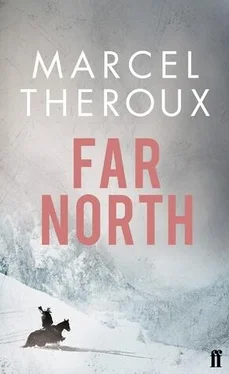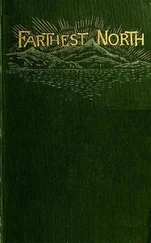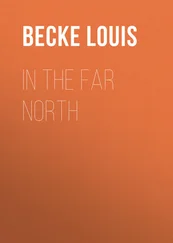After about an hour, they locked up the church and we went back to the house. Yuri boiled up some kind of herb tea.
We couldn’t say anything to each other, but sitting among them felt like the first happiness I’d known for so long. I wished I had something to give them in return. Then it struck me that I did have some words in their language.
I took the memory stone out of my pack, set it on the table between us, and showed them the girl from Polyn. They weren’t happy until they’d seen it half a dozen times.
They loved it. The old priest most of all, slapping the other on the back each time they watched it. Lyudi budushchevo! he laughed, as though it was the best joke in the world.
I was pleased to see him so lively, then a terrible feeling came over me. I understood that he’d taken it as a picture of the present. They thought that was an image of the place as it was today. If I hadn’t seen where it came from, I would have formed the same idea.
Here they were in their outpost, guarding their trove of holy books, waiting for news of the outside world, and it seemed that I’d brought them good tidings.
The misunderstanding made me heavy-hearted. I said to them, ‘You’ve got the wrong idea. This is a picture of the past. This girl is dead. The city looks nothing like this. I’ve been there.’
But the words I was saying were just so much noise to them. They believed what they wanted to. I was the harbinger of something good. Any day now, people would begin to drift back. There would be damp beds airing out in the street. Shovels would turn over the soil in long-neglected gardens. The silent bell in the cupola would call a congregation to service, and someone would pin a medal on the old priest’s chest for taking such care of his archive.
They made me a bed on a ledge above their tiled stove. I told them I’d be happier on the floor but they insisted. It was too warm and soft for me to sleep well up there, and I was troublelyn. They t I’d deceived them. Seeing what false hope had done to them lowered my spirits.
The next morning they were just as cheery. They gave me buckwheat groats for breakfast and asked to watch the memory stone again.
I gave the stone to the priest and told him he could keep it. He tried to press an old book on me in return, but I refused.
The two of them walked me to the edge of their empty village and kissed me three times goodbye.
I looked back half a dozen times and they were still there, watching me go.
*
Spring was on the land. There was no snow to be seen anywhere. One hot noontime, I decided to bathe. I tethered the horse and stripped at the edge of a stream. My feet were so pale they looked bluish.
Although the river was shallow, it was swollen and faster than it looked. I almost took a tumble as I stepped in. I braced my legs against a rock as the current eddied around my knees, then squatted down to let the water wash all over me. The cold made my head ring.
After I’d got myself clean, I laundered my clothes on a rock and then left them to dry in the sun.
I lay on the bank soaking up the heat like a lizard, fighting the urge to drift off, but the sound of the river lulled me to sleep. I must have slept for an hour or more, because I woke up groggy, with my vision all bleached out from the sunshine.
It took me a moment or two to come to my senses: there’s the horse, munching green shoots off a tree, there’s my damp clothes, here’s me, naked, with dried mud up to my ankles that looks like a pair of socks.
And suddenly, over the sound of the river running, I heard a buzz, very, very faint, but growing stronger. Up in the eastern part of the sky, maybe a quarter of a mile up, was the silver glint of a plane.
I stood there naked, shouting myself hoarse and waving my clothes as she passed overhead.
Judging from the angle of her flight, it seemed like she’d come out of the Far North, maybe from Alaska.
By the time I thought to fire my gun, the plane was in the southwest part of the sky.
I loosed off four or five signal shots, but she gave no sign of hearing me. The bullets would have been barely more than faint pops above the sound of the engine.
The plane slipped away into the deep blue of the sky like a tiny silver fish. But as she vanished over the trees behind me, I was certain I knew where she was headed.
IT TOOK ME TWO days to reach the base. I rode like a madwoman. I don’t recall that I ate at all. Sometimes I’d dismount and walk alongside the horse to let her rest. All that time, I could hear my heart banging in my chest with hope.
Seeing that plane the first time at the lake, I’d never known hope like it. I was a castaway. The plane was a sail, luffing and snapping to a new course as it came to find me. I would walk on its warm deck with my pretty feet. There was silk and cloves in its hold, coconuts, oranges. Well, I guess it brought on the hooey in me. There’s a little in there. I am a woman.
The second plane gave me a different kind of joy. This time it was the cavalry. This time it was the law in armour. I pictured it touching down on the base like a twister, ripping the huts out of the ground, scything down the guards. Imagine those captives free and bent on revenge: they’d kill Boathwaite like a dog and scorch his slave camp to the roots.
*
I neared the base around noon and dismounted where the forest began to thin. The land around the walls was bare. It had been clear-cut in the early days for timber and to strip the cover from the approach. I hung back out of sight behind a stand of trees.
My first glimpse of the base was through the spyglass. I could see the mismatched felts on the roofs beyond the
palisade and smoke rising from the smithy and the cookhouse.
The wind brought the hum of the latrines across the open ground. Everything looked smaller and grubbier than I remembered. My eye was jaded after the marvels of Polyn, but it was also because the snow was gone. Snow flatters poor workmanship. It covers up dirt and makes the crooked look quaint. And it keeps things from stinking.
I started to make a circuit of the base, keeping close behind the fringe of trees. There were no men to be seen, but just beside the front gate, no more than twenty yards outside the walls, stood the plane.
What a beautiful thing it was, like a muscle or a blade — all purpose.
There was a ripple of heat haze above its top wing that made it look like it was still in motion.
As nearly as I could remember, it was the same as the one that had gone down by the lake. The colours of its hull were red and white, and it had a door in its tail like the one I had smashed open that time on the hillside.
It had a weathered look. The dents and patches on the wings hinted at the labour it took to keep it flying. And yet I could scarcely believe that the creatures who made that thing were human.
Everything at the base had a handprint on it. Everything took its scale from the shape of a man, and the work he could do in one day. I could judge with my eye how long it would take to raise a stretch of its wall, or level the simple road that ran around it. I could probably name every tool they used to build it.
But to make that plane — was it six months or a century? What mysteries were at work in its engine?
It looked as out of place standing on that bleached grass as the wristwatch had on the herder’s arm.
I am in awe of this broken pianola and the nameless craftsman who fitted her with brass wires and felted hammers and a spiked drum to read the piano rolls. I’ve saved these piles of books for the knowledge that’s in them. I’ve seen Polyn. I marvel dailying wermy morning rides at the beautiful skeleton of my dead city. But to turn words and numbers into metal and make them fly — what bigger miracle can there be?
Читать дальше












